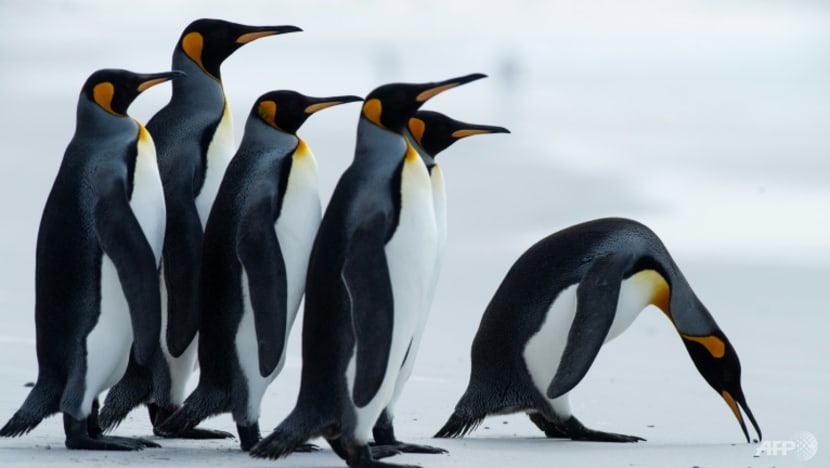Commentary: Silence on biodiversity is deadly
Species are disappearing at an alarming rate and the economic consequences are catastrophic, says the Financial Times' Gillian Tett.

Campaigners have for years called for an effective global agreement on halting biodiversity loss, similar to what the Paris Agreement lays out for climate. (Photo: AFP)
NEW YORK: When Egypt hosted the COP27 climate change talks last month, political heat was triggered — as well as noise. But when the so-called COP15 biodiversity talks started last week in freezing Montreal, there was near silence on the global stage.
Unlike the climate meeting, there are no world leaders in attendance, aside from Canada’s Justin Trudeau. There are few business or finance leaders present. And while there have been intense internal dramas (the talks have repeatedly been about to break down), these have received scant attention, partly because the media presence is small.
This is deeply alarming. This Conference of the Parties to the UN Convention on Biological Diversity was supposed to be “the most significant conference on biodiversity in a decade”, according to the UN. It was called to hammer out a global deal to protect nature, comparable to the headline-grabbing 2015 Paris climate accord.
However, the event was delayed for two years by the COVID-19 pandemic. And time is now running out.
As the World Wildlife Fund notes, the planet is beset by accelerating soil erosion, marine pollution and deforestation.
Species are going extinct “at up to 1,000 times the natural rate of one to five species per year”, according to an institute founded by Henry Paulson, former US Treasury secretary, who notes that “if human society continues on this trajectory, we face a future where 30 to 50 per cent of all species may be lost by the middle of the 21st century”.
This is not just shattering human livelihoods and accelerating climate change; it also has big economic costs. To cite one example: The Paulson Institute says that the extinction of pollinators, such as bees, would cause US$217 billion annual agricultural losses.
WHAT'S BEHIND THE SILENCE?
So why is there silence? One problem is Beijing: China currently holds the rotating nature COP presidency and its officials have hitherto been media-shy and seemingly reluctant (or unable) to bang diplomatic heads together. Another is timing: It was a terrible idea to have the nature COP just after the climate one. Both journalists and politicians are grappling with “green fatigue”.
There are also structural challenges. The fight against climate change has generated political heat because it has been championed by telegenic protesters, like Greta Thunberg. The UN has also created clear targets and catchy slogans, such as the tag “keep 1.5 alive” (in other words, limit warming to 1.5C).
Moreover, the private sector has been co-opted into the climate battle by both fear and greed. Not only is the physical cost of ignoring climate change very clear, but investors and companies have realised they can make money from energy transition technologies, such as hydrogen energy or electric cars. This matters.
But biodiversity is different. In some respects, it should be a popular political cause, since (almost) everybody loves cuddly animals and sparkling oceans. Indeed in America the issue has historically attracted far more bipartisan support than climate change; 20th-century Republicans, for instance, battled to protect national parks.
But one problem is that most biodiversity champions pack less emotional punch than climate ones. Another is that the commercial opportunities in this fight seem less obvious than those in the energy transition.
Moreover, biodiversity is such a complex issue that is hard to measure or communicate with a simple idea. Or, as the economist Partha Dasgupta notes in a powerful unpublished new paper which draws on earlier work, you cannot easily “devise institutions that can provide us with a complete set of the incentives to protect and promote nature ... because nature is mobile and many of nature’s processes are silent and invisible”.
BELATEDLY ENGAGED
Could this change? The good(ish) news is that parts of the private sector are belatedly becoming engaged. A coalition known as the Taskforce on Nature-related Financial Disclosures has emerged and is trying to create nature-based corporate reporting systems. These aim to track water usage, say, as prominently as carbon.
The TNFD is backed by names such as Nestle, Tata Steel, HSBC, Kirin and BlackRock, and some companies, like Aviva, have already produced their own nature reports. A few governments, including the Swiss, tell me they want to make the nature-related financial disclosure mandatory in the future.
Meanwhile, UN officials are pleading with governments to act: They want the Montreal event to agree a global deal to protect 30 per cent of the world’s land and sea by 2030, and to double investments in nature-based solutions by 2025.
Most crucially — and controversially — they also want governments to stop their estimated US$500 billion incurrent annual subsidies to harmful activities such as logging.
Maybe this will still emerge. Global environment ministers have just arrived in Montreal, and will hold talks this weekend in a bid to rescue the summit. Some hope the Chinese will pull diplomatic rabbits out of their hats.
But if the talks collapse, or only produce a mealy-mouthed deal, the world faces accelerating biodiversity loss. And that is something that investors, business leaders and everyone else should shriek about — very loudly.


















